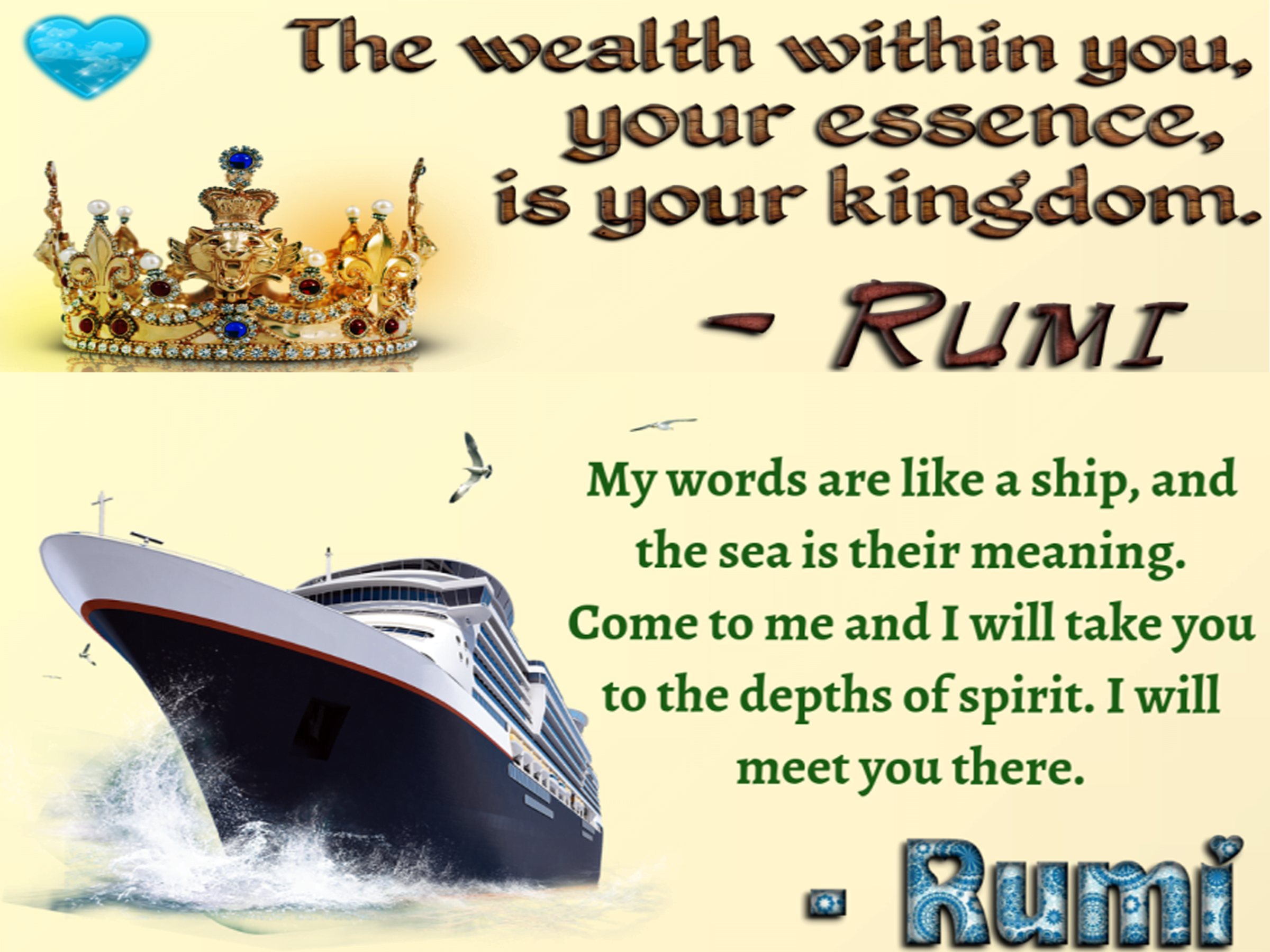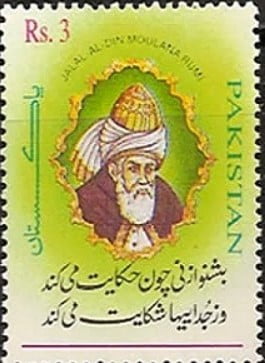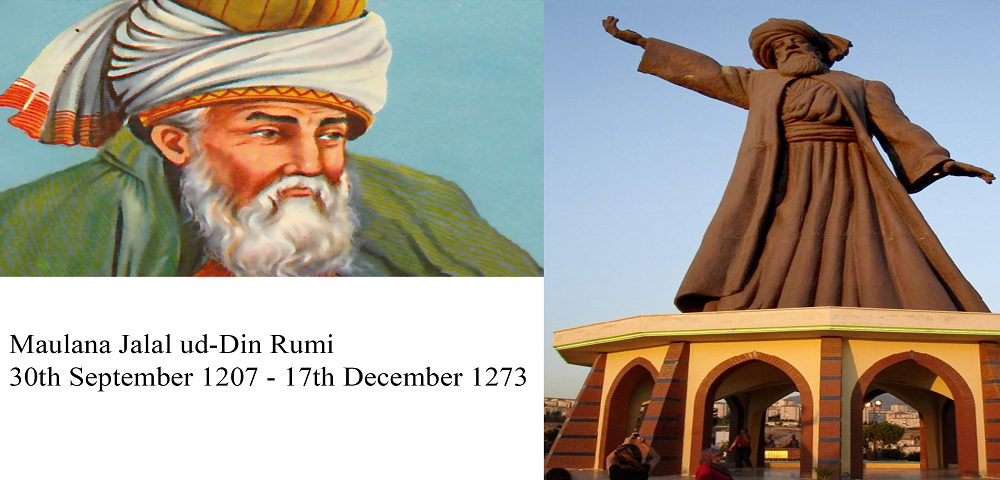Introduction of Maulana Jalal ud-Din Rumi:
| Country | Turkey |
| Century | 13th Century’s famous poet |
| Date of Birth | 30th September 1207 |
| Place of birth | Afghanistan |
| Death | 17th December 1273 |
| Place | Turkey |
| Tomb | Tomb of Mevlana Rumi, Mevlana Meuseum, Konya, Turkey |
| Religion | Islam |
| Coinage | Sunni |
| Notable Concepts | Sufi Whirling, Muraqaba |
| Notable Works | Mathnawī-ī ma’nawī Dīwān-ī Shams-ī Tabrīzī Fīhi mā fīhi |
| Tariqa | Mevlevi |
| Profession | Poetry |
| Interest | Poetry (Poems, ghazals, poetry) & music instruments use in ghazals |
| Poetry Languages | Persian, Arabic & Turkish |
| Father | Baha-ul-Din-Walad |
| Father’s Death | 1228 in Konya |
| Mother’s Name | Mu’mina Khātūn |
| Son | Sultan Walad |
| Friend | Ṣadr al-Dīn al-Qunawī, |
| Translation of Book | Duvan-e-Shams (Collected Poetry of Shams) |
Brief Introduction:
Maulana Jalal ud din Rumi was born in the 13th Century and was the poet of Persian Language. He was born on 30th September 1207 in the city of Turkey, Blakh (Present: Afghanistan). He was a great Islamic scholar, theologian, poet, and the love of Sufi mystic. Rumi’s result beats state borders and ethnic separations: Iranians, Tajiks, Turks, Greeks, Pashtuns, and other Central Asian Muslims and also for the Muslims of the Sub-Continent had appreciated his spiritual inheritance from last seven centuries. His poems and poetry have been translated and convert into many world’s languages; it has been used in different formats. Jalal-ud-din-Rumi has been known as the “most famous poet” and “best-selling poet” in the United States[1].
Much of his work has been in the Persian language. Moreover, he also used “Turkish, Arabic & Geek” in the verses of his poetry. His “Mansavi (Mathnawi)” was collected in Konya and he is known to be the greatest poems in the Persian Language. Much of his work has been used in their original language crosswise in the Greater Iran and the Persian Speaking world. The translation of his works mostly used in Turkey, Azerbaijan, the United States & South Asia. His poetry effect not only the Persian literature but also the traditions of the “Ottoman, Turkish, Chagtai, Urdu, and Pashto languages”[1].
The Name:
Jalal ud din’s mostly called “Rumi” in the English language. The full name of Jalal ud din is “Jalal ad-Din Muhammad Balkhi (Persian: جلالالدین محمد بلخى)” or “Jalāl ad-Dīn Muḥammad Rūmī (جلالالدین محمد رومی)”. Jalal ad-Din is an Arabic language name and its means is “Glory of the Faith”. Balkhi and Rumi are his “Nisbat”, from “Balkh” and from “Rum”. There are many historical VIPs born in or many of the personalities related to Anatolia known as Rumi. A word that was carried from the Arabic Language it’s meaning “Roman”. Kingdom of the people living in Anatolia. Jalal ad-Din was also considered as the “Mullah of Rum”[1].
He was also known by the name of “Molvi” which is the Arabic word origin and its meaning “Master”[1].
The Life of Maulana Jalal ad-Din Rumi:
The parents of Maulana Jalal ad-Din Rumi were speaking the Persian language. He was situated in Balkh and nowadays in “Afghanistan”. The culture of Balkh city was Persian, the center of Persian Culture and there were many creators of Persian language in several centuries. He was inspired by his father and also from the Persian poets named “Attar & Sanai”. Rumi expressed his ideas and appreciate himself “Attar was the spirit, Sanai his twin eyes, and in time thereafter, came in the train” and he also mentioned in another poem “Attar has traversed the seven cities of Love, we are still at the turn of one street”. The father of Jalal ad-Din Rumi was linked with the spiritual family of Najm al-Din Kubra[1].

Most of his works in Seljuk:
Maulana Jalal ad-Din Rumi’s lived most of his life in the Persianate Seljuk Sultanate of Rum. He did most of his work there and died in 1273AD. He was buried in Konya, and his tomb became a place of a journey for the Muslims. After the death, his followers and his son “Sultan Walad” establish the Mevlevi Order, and it was also known as the “Order of the Whirling Dervishes”, which were eminent for the dance of Sufi known as the “Sama ceremony”. He was buried along with his father; the tomb was built and the rest of his body was buried. A hagiographical account of his described in Shams ud-Din Ahmad Aflaki’s Manaqib ul-Arifin (written between 1318 & 1353).The life needs to be withdrawn with the attention as it comprises both folklores and truths about the Rumi[1].
Childhood and Migration:
Jalal ad-Din Rumi’s father’s name was “Baha ud-Din Walad” which was a theologian jurist and a mystic (صوفیانہ) from the city of Balk. He was also known as “Sultan ul-Ulama” or “the Sultan of Scholars”. The famous hagiographical assertion that had claimed that he could not form the “Khalifa Abu Bakr” and it has been rejected through modern scholars. There were most of the genealogy that offered for the family elasticities back to six or seven age groups for attractive eminent Hanafi Jurists[1].
Mother of Jalal ad-Din Rumi:
We didn’t hear the name of Baha al-Din’s mother in the foundations, but he only referred to her as “Māma (colloquial Persian for Māma)” and she was a simple woman that lived in the 1200s.
The mother’s name of Rumi was “Mu’mina Khātūn”. They had the profession of liberal Hanafi rite, from many generations and was Islamic preachers. This family trend to followed by Rumi (see his FIhi Ma Fih and Seven Sermons) and his son Sultan Walad (see Ma’rif Waladi for examples of his everyday sermons and lectures[1].
Marriage of Jalal ad-Din Rumi:
Jalal ad-Din Rumi did marriage with “Gowhar Khatun”, she was from “Karaman”. Then ALLAH blessed them with two sons: “Sultan Walad & Ala-eddin Chalabi”. Unfortunately, his wife died, Jalal ad-Din did 2nd Marriage and ALLAH again blessed with a son “Amir Alim Chalabi” and with a daughter “Malakeh Khatun” [1].
Anatolia:
He was settled in “Anatolia” in the year 1228. He was mostly as a result of the insistent invitation of ‘Alā ud-Din Key-Qobāad, where there was the ruler of Anatolia lived. Baha’ ud_Din came and finally settled in the Konya in Anatolia. At that time, it was the Western territories of the “Seljuk Sultanate of Rum” [1].
Education & happenstances with Shams-e-Tabrizi:
Baha’ ud-Din became the head of a Madrassa. After the death of Baha’ ud-Din, the age of Rumi was 25 years and he was standing at the position of Molvi in Islam. During the learning period, Rumi traveled with Shams-e-Tabrizi in 1244 that changed his life completely. Shams also traveled about the whole Middle East and prayed for someone who could “endure my company”. The voice came and asked “What will you give in return?”, he answered “My Head!”. Then the sound again came “the one you seek is Jalal ud-Din of Konya” [1].

Rumi and Shams had love between them. At the death of Rumi, Shams often express the sadness and went out to find the lyrics for poems in the love of Rumi. Then, he realized that[1];
Why Should I seek? I am the same as him.
His essence speaks though me.
I have been looking for myself! [1]
Later life:
Mewlana had been continuously united ghazals (Persian poems). These were collected in the “Divan-e-Kabir”. Rumi was one of the people and make his friend, he was Salah ud-Din-e Zarkub, he was a goldsmith[1].
At one day, Hussam-e Chalabi & Salah ud-Din Zarkub were traveling by “Meram vineyards”, from the outside of Konya. Hussam gave the idea to Rumi and said, he had an idea “If you were to write a book like the Ilāhīnāma of Sanai or the Mantiq ut-Tayr of ‘Attar, it would become the companion of many troubadours. They would fill their hearts from your work and compose music to accompany it.” [1]
Then Rumi gave a smile and a piece of paper, on the paper there were written 18 (eighteen) lines of the book Masnavi, it was started from[1]:
Listen to the reed and the tale it tells,
How it sings of separation… [1]
In the year of 1273 in December, Rumi got ill, he knows that when he would die. After that, he self-possessed well-known Ghazal, and the verses were started from[1];
How doesn’t thou know what sort of king I have within me as a companion?
Do not cast thy glance upon my golden face, for I have iron legs. [1]
Death:
Rumi died in Konya on 17th December 1273. On his death, his tribal was depressed by Konya. The local Christians and the Jews joining the crowd and was passed by the City of Konya. He was buried along with his father. On his grave, it was written as[1]:
When we are dead, seek not our tomb in the earth,
But find it in the hearts of men[1]
The Queen of Georgia:
There were many friends of Rumi, one of them was the queen of Georgia, she was very close to Rumi. She was the single lady who also supported building the tomb in Konya. After that, there were built Masjid, Mausoleum, dance halls, schools, and living quarters for the dervishes’ and he is being remembered today. Many visitors visit the tomb of Rumi of every religion[1].
Teaching:
Rumi was love with the Sufi’sm and mystic of Persian literature, his poetry inspires and deep which speaks the words of love. His teachings express the Quranic verses, after his death, Sham-e Tabrizi gave the cited “Know that ‘There is no God but He,’ and ask forgiveness for your sin (Q. 47:19)” [1].
| از جمادی مُردم و نامی شدم وز نما مُردم به حیوان برزدم مُردم از حیوانی و آدم شدم پس چه ترسم کی ز مردن کم شدم؟ حملهٔ دیگر بمیرم از بشر تا برآرم از ملائک بال و پر وز ملک هم بایدم جستن ز جو کل شیء هالک الا وجهه بار دیگر از ملک پران شوم آنچ اندر وهم ناید آن شوم پس عدم گردم عدم چون ارغنون گویدم که انا الیه راجعون | I died to the mineral state and became a plant, I died to the vegetal state and reached animality, I died to the animal state and became a man, Then what should I fear? I have never become less from dying. At the next charge (forward) I will die to human nature, So that I may lift (my) head and wings (and soar) among the angels, And I must (also) jump from the river of (the state of) the angel, Everything perishes except His Face, Once again I will become sacrificed from (the state of) the angel, I will become that which cannot come into the imagination, Then I will become non-existent; non-existence says to me (in tones) like an organ, Truly, to Him is our return. [1] |
The other Verses in the Masnavi, Rumi explained in the detail and gave the universal message of love[1]:
The lover’s cause is separate from all other causes
Love is the astrolabe of God’s mysteries. [1]
Many instruments were liked by Rumi, but the one he liked the most was “nay (reed flute)”. Many categories are divided; the quatrains (rubayāt) and odes (Ghazal) of the Divan, the six books of Masnavi. The works in the prose are divided into “The discourses, The letters, and the seven seromons” [1].
Poetic Works:
The best work of Rumi was “Matnawiye Ma’nawi (Spiritual Couplets; مثنوی معنوی)”. The six-Volume poem which grips a famous place within the rich tradition of Persian Sufi literature, and been commonly called “The Quran in Persian”. It contains about 27,000 lines each of the lines consists of the couplet with the internal couplet[1].
Other works of Rumi which are considered as the major work “Dīwān-e Kabīr (Great Work) or Dīwān-e Shams-e Tabrīzī (The Works of Shams of Tabriz; دیوان شمس تبریزی)”, the name was given in honor of Rumi’s Master Shams. There are about 35000 Persian couplets and 2000 Persian quatrains[1].

Prose Work:
Fihi Ma Fihi (In It What’s In It, Persian: فیه ما فیه) which provides the record of seventy-one talks and lectures were given by Rumi on several events to his followers. It was compiled from the notes of his follower and Rumi did not write it as an author directly[1].
Makatib (The Letters, Persian: مكاتيب):
Makatib or the Maktubat is the collection of the letters that are written in the Persian language by Rumi’s. The letters were being tested that help the Rumi busy for helping family members and administrating a community of followers who were grown up in that time[1].
Spiritual View:
Jalal ud-Din Rumi was from the class of Islamic Philosophers that were from the Ibn Arabic and Mulla Sadra. These inspirational philosophers are from the traditional schools of Irfan, the philosophy and theosophy from the earliest life of the Muslim World. Jalal ud-Din Rumi was a Muslim Scholar and grabbed Islam seriously[1].
| در راه طلب عاقل و دیوانه یکی است در شیوهی عشق خویش و بیگانه یکی است آن را که شراب وصل جانان دادند در مذهب او کعبه و بتخانه یکی است | On the seeker’s path, wise men and fools are one. In His love, brothers and strangers are one. Go on! Drink the wine of the Beloved! In that faith, Muslims and pagans are one. [1] |
Pakistan:
Pakistan’s national Poet which was “Allama Muhammad Iqbal” was also inspired by the works of Rumi and he considered as the spiritual leader as “Pir Rumi” in poems. The word “Pir” was used, which means that “old man” but in the Sufi context, this means master, founder, creator, and guide[1].
Pakistan Post Stamp:
Pakistani Government issued the stamp to remember the works of Maulana Jalal ud-Din Rumi.

References:
1. Wikipedia. 14th August 2020; Available from: Wikipedia.

